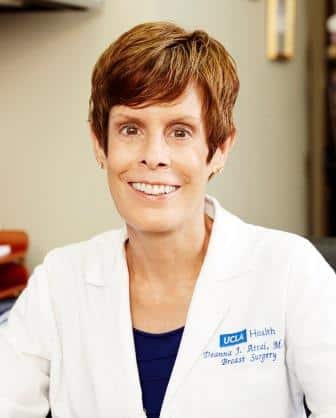Ask the Expert

Questions following the 8/14/18 webinar, “Breaking News In Breast And Ovarian Cancer And What Should I Make Of It?”
Q1: Are there any new updates regarding breast cancer and Lynch Syndrome?
Dr. Deanna Attai: Not regarding specific treatment regimens (like we discussed for BRCA mutation carriers and PARP inhibitors)
Q2: What is the longest someone has been on a PARP inhibitor safely with efficacy?
Dr. Deanna Attai: I’m not aware of the duration of therapy for breast cancer as these agents have only recently been used in breast cancer patients. In a recent New England Journal of Medicine study looking at the use of PARP inhibitors in patients with metastatic breast cancer, patients were treated until disease progression, until toxic effects, or if the patient or physician decided to stop therapy. Median duration of treatment was 6 months, but of course some patients may have done well on a longer course of therapy.
Q3: Have PARP inhibitors been studied in patients with PALB2 mutations as well, since PALB2 works so closely with BRCA2?
Dr. Deanna Attai: Not to my knowledge.
Q4: I changed from anastrozole to tamoxifen, and 6 and 9 months later my liver enzymes were elevated. How common is fatty liver and a significantly echogenic liver diagnosed in patients on tamoxifen?
Dr. Deanna Attai: Elevation of liver enzymes and fatty liver can occur on tamoxifen, which is why the medical oncologist will usually recommend that the liver enzymes be monitored. I’ve seen reports of up to 30% but studies vary.
Q5: Is there any stem cell research in controlling breast cancer?
Dr. Deanna Attai: Not to my knowledge.
Q6: How beneficial is tamoxifen for BRCA2+ women diagnosed with stage 1 breast cancer?
Dr. Deanna Attai: Tamoxifen is beneficial for any patients that have an estrogen receptor (ER) positive breast cancer, regardless of whether or not they have a genetic mutation.
Q7: Is avastin ever used for breast cancer to prevent metastatic growth?
Dr. Deanna Attai: It has been tried and while a small percentage of patients were helped, the side effects, including death, led the FDA to remove breast cancer as an indication for avastin therapy. It is used in other cancers.
Q8: Are you aware of any studies being done at this time in regard to High Grade/Triple Negative breast cancer/DCIS? I learned that 6 subtypes of triple negative BC have already been identified.
Dr. Deanna Attai: There are many studies ongoing regarding the different subtypes of triple negative breast cancer – there are likely at least 5 triple negative subtypes.
Q9: Is it safe to use vaginal atrophy creams like Premarin while using Tamoxifen?
Dr. Deanna Attai: We do not normally recommend any estrogen (including phytoestrogen) compounds after breast cancer treatment due to the potential for absorption into the body and impact on the breast, which may increase risk of recurrence. However, some oncologists permit use of a low dose of estrogen vaginal cream to treat atrophy and pain. This is something that needs to be discussed with an individual’s oncologist.
Q10: Why did TAILOR study not use the risk <18 as the low risk group that Onco DX uses? Why not cut off low risk disease at RS 10?
Dr. Deanna Attai: In the TAILORx study, patients were assigned to 3 groups based on their scores, low, intermediate and high risk. Because the low risk group was not going to get any chemotherapy, the investigators felt to be safe, to change the low risk cutoff to 10 instead of 18 (the “original” low risk cutoff).
Q11: How much do you think avoiding certain foods, particularly sugar, in the diet is important for breast cancer survivors?
Dr. Deanna Attai: Personally, I recommend a balanced diet, with a focus on vegetables, whole grains, and lean meats and fish. Sugar is in every food and is impossible to avoid. While most of us have room to “clean up” our diets, there is little good data on any specific diet for those who have been treated for breast or other cancers.
Q12: Should patients ask their oncologists about these newer treatments? How widely are they available? And for how advanced the stage?
Dr. Deanna Attai: I would definitely encourage patients to discuss their questions with their oncologist. Their oncologist can inform them if a particular study is relevant to them and if one of the newer therapies may be right for them.
If you have any personal questions or concerns, contact Sharsheret’s clinical team at [email protected]
